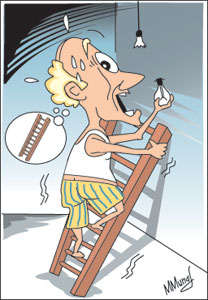Fears and forgetfulness
View(s):This week Dr. Hanwella takes a break from his series on coping with stress to answer some questions posed by readers of this column
Mr. DA from Homagama writes: “I am a 75 year-old retired public servant. I tremble with fear when I climb steps or a ladder. I fear to go near the balcony of even the third floor of a building. I cannot go in a lift and when I look around from a hill top I feel faintish.”
“The second problem is that I have lost confidence in almost everything. I keep on thinking about failures. I lost my son in an accident 10 years ago and since then life has been miserable for me.”
A: Dear Mr DA, you have two separate problems. The first problem, I suspect you have had for many years, perhaps since childhood. What you so clearly describe is a simple phobia called acrophobia (Greek acron- summit and phobos- fear), an extreme or irrational fear of heights. A mild fear of heights is normal especially when there is little or no protection. People who are confident in such situations are said to have a ‘head for heights’.

Simple phobias usually start in childhood and common phobias include fear of snakes (ophidiophobia) and fear of darkness (nyctophobia). Probably the commonest phobia is fear of snakes and up to a third of adults may have this condition. Some of these fears if not too severe could be considered ‘normal’. A phobia is considered to be pathological when it interferes significantly with the day-to-day life of the person.
The treatment is simple and if followed rigorously leads to an almost complete cure. It is called graded exposure. In the first instance the person is asked to make a list of his fears in a hierarchical order from the least to the greatest fear. For example in the case of a snake phobia the least fear may be seeing a picture of a snake and the greatest fear could be handling a snake. In the second phase the person is exposed to these fears in a stepwise manner. At each exposure the anxiety initially rises and then reduces when the person habituates to the fear. He is then exposed to the next level or fear and so on until he can face the greatest fear without running away.
The important factor in therapy is that the person is exposed to each stage sufficiently that the level of anxiety increases and then reduces. If the time of exposure is too short the phobia might even increase. This also explains why phobias do not resolve naturally. People simply do not stay in the phobic situations long enough.
Your second problem is more serious. I think you have a depressive disorder. It is probable that it started with the death of your son and your subsequent grief. Depressive disorder is an illness and different to grief and simply feeling sad. The technical term is often confused with the lay meaning of the term.
This is unfortunate in that it sometimes prevents people from seeking help. Depressive disorder has four cardinal symptoms- persistent low mood, anhedonia or inability to enjoy previously enjoyed pursuits, apathy or lack of interest in day-to-day affairs, and asthenia or a feeling of weakness (this weakness has a different quality to physical weakness).
These main symptoms may be accompanied by what we call somatic symptoms such as insomnia (usually waking up very early in the morning), loss of appetite, and loss of weight and body aches. In more severe cases it may progress to feeling worthless or even suicide. Moderately severe depression could be treated with either psychotherapy or drugs. More severe cases need treatment with antidepressant drugs.
Mrs W a retired staff nurse writes: “I am 80 years old and my problem is loss of memory. My doctor has told me that with advancing age loss of memory is normal. When I go shopping I sometimes leave the goods I have bought and walk out. I meet people with whom I have worked in the past and fail to recognise them. I leave my room to go to the pantry to get something. Once I go there I forget why I went there for. I mix up the days and dates. When I do my religious observations I sometimes forget the stanzas and need to refer to the book.”
A: Mrs W, you have a condition known as dementia. It is commoner in the elderly but is not a normal part of aging. It is a disease condition. Unfortunately even some doctors are not aware of this and tend to ignore the complaints of patients attributing it to old age. Our memories do get a bit affected as we age but this is usually a slowing of recall rather than an actual loss of memory.

A classic early sign is loss of recent memory (forgetting why you went to the pantry). This later progresses to loss of long term memory (forgetting the religious stanzas). There are a number of causes for dementia but only two are common. They are: Alzheimer’s dementia and vascular dementia. In Alzheimer’s dementia there is degeneration of the nerve cells of the brain.
We still don’t know exactly why this happens though there are numerous theories. In vascular dementia there is blockage of the small blood vessels in the brain leading to death of nerve cells due to lack of oxygen. This type of dementia is more common in those with high blood pressure, diabetes and elevated levels of cholesterol. Mixed types can be seen too.
The first step is to assess the degree of memory loss and identify the type of dementia you are having. You will need to answer some questions from a standard questionnaire, take some blood tests and if necessary undergo a brain scan. After this we would be in a position to decide on the treatment. Treatments are available to slow down or even improve memory loss and the earlier these treatments are started the better the outcome.
Mr DA and Mrs W, we will post you an appointment to see us in the University Psychiatry Unit outpatient department.
We do have a service for memory testing in our Department in the Faculty of Medicine, Colombo. It is a pen and paper test and will take approximately an hour to complete. You can ask for an appointment by phoning the department on 011 2691688 during working hours.

MediScene continues a new series on mental illness by Consultant Psychiatrist Dr. Raveen Hanwella. Dr. Hanwella who is attached to the National Hospital is also a Senior Lecturer in Psychiatry and Head, Department of Psychological Medicine, Faculty of Medicine, University of Colombo.
Something bothering you? Please write in to Dr. Hanwella C/o MediScene, The Sunday Times, No. 8, Hunupitiya Cross Road, Colombo 2 or e-mail: raveensundaytimes@gmail.com
Follow @timesonlinelk
comments powered by Disqus


